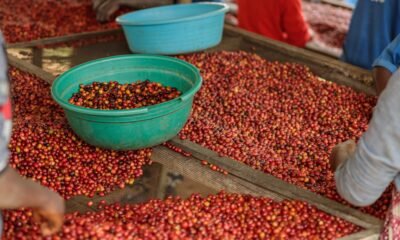Sports
The Transformative Impact of World Cup Qualification for Uganda
If the Cranes secure a place in the expanded 48-team World Cup, the impact could reshape their sporting landscape, economy, and collective spirit.

For the first time in its history, Uganda stands on the brink of a dream that has eluded the nation since its initial foray into FIFA World Cup qualifiers in 1978. As of March, 2025, the Uganda Cranes hold 9 points in CAF Group G and are still in contention for the 2026 tournament in the United States, Canada, and Mexico. With five matches remaining, including key games against Botswana and Mozambique, qualification feels closer than ever. Following their successful bid for a spot in the 2025 Africa Cup of Nations (AFCON) in Morocco, Uganda’s football resurgence adds momentum to this moment. If the Cranes secure a place in the expanded 48-team World Cup, the impact could reshape their sporting landscape, economy, and collective spirit.
A Historic Milestone and National Pride
Uganda has competed in at least 13 World Cup qualification cycles without success, from an early exit against Zambia in 1978 to near misses in 2010 and 2018. Reaching the 2026 finals would be a historic breakthrough, placing the Cranes among the global elite and ending decades of drought. The FIFA World Cup, held every four years since 1930 and watched by billions, represents football’s pinnacle, a stage where legends emerge and nations unite. This ambition builds on their recent AFCON 2025 qualification, clinched in November 2024 with two games to spare in Group K. Finishing second behind South Africa with 13 points, thanks to victories like a 2-1 win over South Sudan and a 1-0 triumph against Congo Brazzaville, the Cranes demonstrated resilience under coach Paul Put. Their eighth AFCON appearance, and first since 2019, has already sparked national pride. A World Cup berth would further unite Uganda’s diverse communities, where football, backed by 15 CECAFA Cup titles and a 1978 AFCON runner-up finish, holds deep significance.
Economic Windfall and Global Spotlight
Qualifying for the World Cup would bring immediate economic benefits. Although the tournament will take place in North America, Uganda stands to gain at home. Fan zones, watch parties, and merchandise sales would boost local businesses, especially in cities like Kampala, enhancing the hotel, restaurant, and retail sectors. The global spotlight could also showcase Uganda’s tourism appeal, featuring attractions like Lake Victoria and Bwindi Impenetrable Forest. AFCON 2025, scheduled from December 21, 2025, to January 18, 2026, will provide a glimpse of this potential as fans rally for Morocco. A World Cup spot would amplify this effect and attract sponsorships and investments. FIFA’s prize money, often in the millions for participating teams, could fund upgrades to facilities like the Mandela National Stadium, where they beat Guinea 1-0 on March 25, 2025, further strengthening football’s foundation.
A Launchpad for Players and the Sport
For Uganda’s players, the World Cup would present a career-defining opportunity. Allan Okello, who scored a crucial free-kick against Guinea to keep World Cup hopes alive, and Denis Omedi, a standout in AFCON qualifiers, could shine on this stage. AFCON 2019 saw them reach the round of 16, and 2025 offers another platform, but the prestige of the World Cup could lead to contracts with international clubs, much like Senegal’s Sadio Mané after 2018. This exposure would enhance Ugandan football’s technical capabilities as players return with new skills. At the grassroots level, the Cranes’ return to AFCON has already generated excitement. An appearance at the World Cup would fuel a surge in youth participation, elevating underfunded academies and local leagues toward a thriving football culture.
Unity and Morale in a Challenging Context
Football has a unique ability to unite people, and in Uganda, a nation facing political and economic challenges, the sport could provide a significant morale boost. Past World Cup campaigns saw Uganda narrowly miss qualification in 2010, falling short to Benin, and in 2018, losing out to Egypt. Additionally, absences from the Africa Cup of Nations (AFCON) in 2021 and 2023 highlighted the need for victories to rally the nation. The early qualification for AFCON 2025, celebrated in November 2024, reinforced this spirit. Securing a World Cup spot would elevate that sense of unity even further. As Kenya and Tanzania also aspire to reach their first World Cup, Uganda’s AFCON success as the first CECAFA qualifier positions the country as a regional leader, a role that a World Cup berth would solidify.
A Legacy for the Future
The expanded format of the 2026 World Cup, which will feature at least nine slots for African teams, presents Uganda with its best opportunity yet. The momentum gained from AFCON fuels optimism for success. Achieving this goal could set a lasting precedent for the future. Competing against top teams would sharpen strategies for upcoming cycles, possibly ending the World Cup drought for Uganda permanently. Furthermore, FIFA’s financial rewards, combined with increased government attention sparked by both AFCON and World Cup ambitions, could strengthen the Federation of Uganda Football Associations (FUFA), which has long struggled with limited resources. Over time, Uganda could evolve from a regional contender with a memorable AFCON final in 1978 and recent achievements of 9 points in World Cup Group G and 13 in AFCON Group K into a consistent force in African football.
If Uganda qualifies for the 2026 World Cup, the impact would be profound, building on their AFCON 2025 success. It is more than just a game; it represents the nation stepping onto the world stage, gaining economically, inspiring its youth, and crafting a lasting legacy. After 13 World Cup cycles filled with struggle and hope, complemented by eight AFCON appearances, the potential triumph of the Cranes would echo beyond football, demonstrating that Uganda belongs among the giants of the sport. With five World Cup qualifiers remaining and Morocco 2025 ahead, the dream remains vibrant, and the stakes have never been higher.

Sports
The Alarming Rise of Gambling in Uganda
By 2017, studies estimated that over 40% of youth in Kampala had engaged in betting.

In recent years, Uganda has experienced an unprecedented surge in gambling, transforming what was once a modest pastime into a widespread phenomenon reshaping society. From the bustling streets of Kampala to rural trading centers, betting shops and online platforms have proliferated, driven by a mix of technological access, economic desperation, and a cultural affinity for risk. While this gambling boom has contributed to government revenues, with tax income soaring to Shs 151 billion in the 2022/23 fiscal year, it has also cast a dark shadow over individuals, families, and communities. The rapid increase in gambling requires urgent attention, as its unchecked growth threatens to unravel the social fabric of the nation.
Gambling in Uganda is not a new phenomenon. Traditional games like omweso indicate a cultural tolerance for chance, while colonial-era lotteries and post-independence casinos laid the groundwork for formal betting. However, the 2010s marked a critical turning point. The spread of affordable smartphones, mobile money platforms like Mobile Money, and a national obsession with soccer propelled sports betting into the mainstream. By 2017, studies estimated that over 40% of youth in Kampala had engaged in betting, a figure likely to be even higher today as offshore online platforms bypass local regulations. What began as a trickle of revenue at UGX 0.24 billion in 2002/03 has now become a torrent, but the social costs remain a pressing concern.
The statistics are stark, but the personal stories behind them are devastating, impacting men and women in different ways. Young men, often jobless or underemployed, are driving the gambling surge, with up to 45% of those aged 18-30 in urban areas betting regularly, drawn in by sports and the promise of quick cash. A 2023 study of university students found that males were over twice as likely to gamble weekly compared to their female peers, reflecting cultural norms linking risk to masculinity. For many, gambling becomes a trap. Some individuals spend 30% of their income on bets, spiraling into debt with loan sharks or pawning family assets. Addiction is widespread, with up to 20% of male bettors showing signs of problem gambling, leading to anxiety, depression, and worse.
Women, although less visible in discussions around gambling, are increasingly becoming entangled in this web. Online platforms and mobile money have facilitated greater female participation, rising from negligible levels to 10-15% among urban youth, often driven by economic necessity rather than leisure. Single mothers and those supporting families turn to betting to bridge income gaps, where women typically earn 30% less than men. However, when men’s gambling losses drain household funds, women bear the brunt, often taking additional jobs, facing domestic strife, or having to withdraw their children from school. Female gamblers, though fewer in number, hide their habits under greater stigma, receiving less support for the stress it brings. Across all genders, families suffer. Rent goes unpaid, marriages fracture, and rural farmers neglect their fields in favor of betting shops, undermining food security.
Supporters of gambling argue that it boosts the economy by creating jobs in betting outlets and generating tax revenue for public services. However, this benefit is overshadowed by significant drawbacks. Much of the profit flows to foreign companies, widening inequality as money drains from the poorest to the wealthiest. Productivity also suffers, as hours spent gambling reduce the workforce’s effectiveness. Additionally, the rise in petty crime such as theft and fraud committed to fund bets places further strain on an already stretched police force, while unregulated online platforms take advantage of players with little oversight.
The government is aware of the issue. In 2019, President Museveni halted the issuance of new betting licenses and allowed existing ones to expire, citing concerns about addiction and social harm. While religious groups welcomed this decision, it ultimately backfired. Gamblers simply turned to offshore sites, escaping the reach of Ugandan law. Enforcement efforts have fallen behind, enabling the industry to thrive in the shadows, leaving regulators struggling to manage a rapidly evolving digital landscape.
Uganda stands at a crossroads. The rise of gambling presents some short-term benefits but threatens long-term consequences for both men and women. A comprehensive strategy is needed, one that goes beyond superficial measures. Stricter regulations on online betting, public awareness campaigns addressing male bravado and female vulnerability, and addiction support tailored to both genders are crucial initial steps. Additionally, providing economic alternatives, such as job opportunities and skills training, can lessen the appeal of gambling, especially for youth and women who face wage gaps. Without decisive action, the nation risks losing a generation to a vice that promises much but delivers little, leaving men in debt, women in despair, and families in turmoil.
The stakes are high, not only for those who gamble. The future of Uganda hangs in the balance. Will we heed the warning signs, or allow this gamble to unfold to its bitter conclusion?
-

 Entertainment5 months ago
Entertainment5 months agoMuseveni’s 2025 Copyright for Musicians breakdown
-

 Business5 months ago
Business5 months agoUganda’s Ministry of Finance projects significant growth opportunities in 2025
-

 Policies5 months ago
Policies5 months agoBreakdown of the Uganda Police Force Annual Crime Report 2024
-

 Health5 months ago
Health5 months agoBreaking down the Malaria Vaccine Rollout in Uganda
-

 Entertainment5 months ago
Entertainment5 months agoIsaiah Misanvu Teams Up with Nil Empire for a Soul-Stirring Anthem of Gratitude and Transformation “Far Away”
-

 Policies5 months ago
Policies5 months agoIs Uganda’s Shs10m Fine the WORST Thing for Cohabiting Couples?
-

 Business5 months ago
Business5 months agoUber and Lyft are finally available in all of New York State
-

 Entertainment5 months ago
Entertainment5 months agoUganda Cracksdown On Vulgar Music Content | Gloria Bugie, Shakira Shakira, targeted






